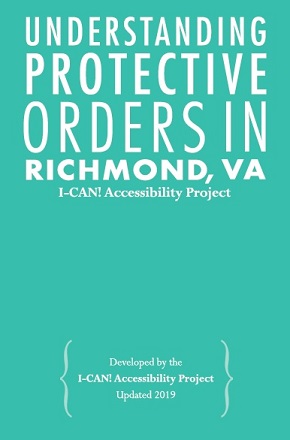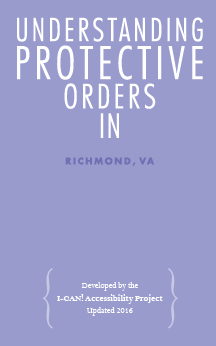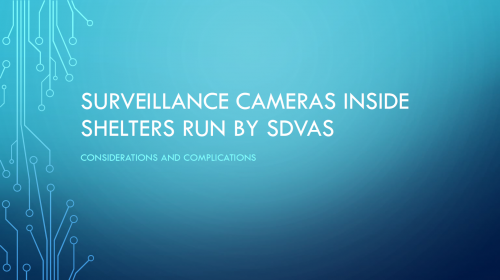Resources Library:
Start a Search:
Understanding Protective Orders in Richmond, VA

I-CAN! is a collaboration between the Partnership for People with Disabilities and the VCU School of Social Work and is supported by grant funding through the Virginia Sexual and Domestic Violence Victims Fund by the Virginia Department of Criminal Justice Services. The mission of the I-CAN! Accessibility Project is to promote and facilitate awareness about the abuse of people with disabilities and to advocate for equal access to services and legal protections. The project began in 2007 and has successfully received continuation grants every two years.
This booklet provides specific information and resources for individuals living in Richmond, Virginia, but it may also be helpful for individuals living in other areas of Virginia.
Understanding Protective Orders in Virginia: What you need to know

This video, “Understanding Protective Orders in Virginia: What you need to know” is a useful resource for anyone with a family abuse protective order in Virginia. This video aims to make information about protective orders more accessible to both petitioners (individuals seeking to be protected) and respondents (individuals who the protective order is filed against). It explains definitions, conditions, and Virginia law related to protective orders in plain language and is available in English (with or without captions) Spanish.
NOTE: This video was created in July 2020 and state and federal law may have changed. The video was created as a project of the Pulaski Juvenile and Domestic Relations District Court Domestic Violence Docket with funded in part by a V-STOP award #15-M4161VA14 and #20-Q4161 VA-19 awarded to the Office of the Executive Secretary of the Supreme Court of Virginia from funds authorized by the federal Violence Against Women Act awarded to Virginia by the U.S. Department of Justice. Opinions or points of view expressed do not necessarily represent those of DCJS, OES, or the U.S. Dept. of Justice.
Click here to view the video in ENGLISH.
Click here to view the video in ENGLISH with captions.
Haga clic aquí para ver el video en español.
Understanding Protectve Orders in Richmond, VA

This booklet was developed by the I-CAN Accessibility Project a collaboration between Partnership for People with Disabilities. It describes Virginia’s Protective Order process. Includes: What is a Protective Order and how it can help you? Types of Protective Orders and what to expect when you go to the Courthouse.
Use of Surveillance Cameras Inside Shelters Run by SDVAs

Across the U.S., there has been an increase in the use of video camera surveillance. Individuals are using these in their homes or just outside of the home to deter crime or monitor their homes while away. As with any technology, there are empowering uses and risks.
Recently, the National Network to End Domestic Violence (NNEDV), a partner and technical assistance provider for the Action Alliance, notified us that they have been receiving requests for information about the use of surveillance cameras inside shelter spaces. We have created some rough guidance for you based on
Virginia-specific laws (where applicable) and the experiences of Action Alliance staff to help you determine if this is the right path for your agency to take.
To view the recorded webinar, follow this link. For additional resources, see below.
VA, DOD study a major breakthrough for understanding PTSD
Researchers from the Department of Veterans Affairs (VA) and Department of Defense (DOD) recently released findings of a new study called Prospective Post-Traumatic Stress disorder Symptom Trajectories in Active Duty and Separated Military Personnel, which examines Post Traumatic Stress Disorder (PTSD) symptoms in Veterans, compared with active-duty populations.
This is the first known study comparing PTSD symptom trajectories of current service members with those of Veterans, and is the product of a collaborative effort from VA and DOD researchers analyzing data from the Millennium Cohort Study (MCS), the largest prospective health study of military service members.
To learn more about the study itself, click here.

